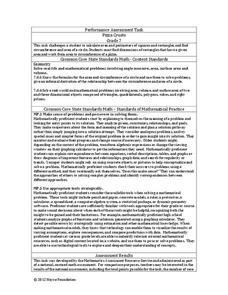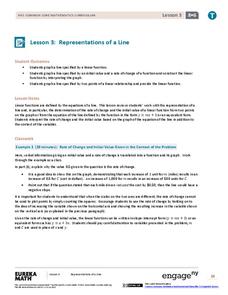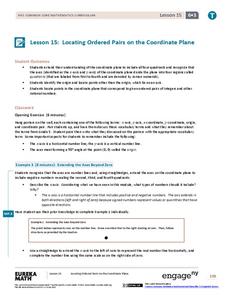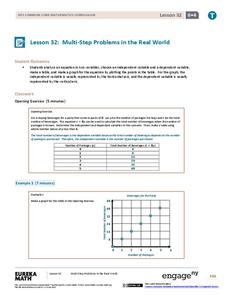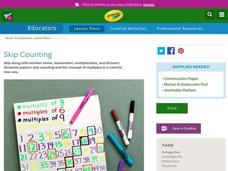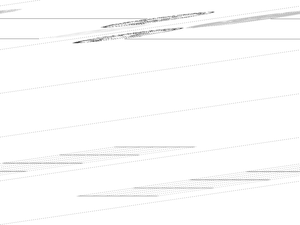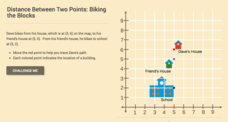Corbett Maths
Enlargements Using Ray Method
Figure out what to do when there is no grid to count. Using a ruler and a sharp pencil, the narrator shows how to perform a dilation when the figure is not on a grid. The ray method works by drawing a ray from the center of dilation...
EngageNY
Mid-Module Assessment Task: Grade 8 Module 3
How well does the class understand dilations? The three-part assessment presents problems related to the properties of dilations. Pupils perform dilations and determine whether a dilation is responsible for a specific image.
Noyce Foundation
Pizza Crusts
Enough stuffed crust to go around. Pupils calculate the area and perimeter of a variety of pizza shapes, including rectangular and circular. Individuals design rectangular pizzas with a given area to maximize the amount of crust and do...
EngageNY
Constant Rate
Two-variable equations can express a constant rate situation. The lesson presents several constant rate problems. Pupils use the stated constant rate to create a linear equation, find values in a table, and graph the points. The resource...
EngageNY
Introduction to Simultaneous Equations
Create an understanding of solving problems that require more than one equation. The lesson introduces the concept of systems of linear equations by using a familiar situation of constant rate problems. Pupils compare the graphs of...
EngageNY
Representations of a Line
Explore how to graph lines from different pieces of information. Scholars learn to graph linear functions when given an equation, given two points that satisfy the function, and when given the initial value and rate of change. They solve...
EngageNY
Locating Ordered Pairs on the Coordinate Plane
Four quadrants, four times the fun. Future mathematicians learn the terminology associated with the coordinate plane and how to plot points in all four quadrants. A worksheet tests their understanding of the material in the 16th...
EngageNY
Multi-Step Problems in the Real World
Connect graphs, equations, and tables for real-world problems. Young mathematicians analyze relationships to identify independent and dependent variables. These identifications help create tables and graphs for each situation.
Curated OER
Pumpkin Predictions
It's time for Halloween and math! Perfect for Fall, this simple worksheet provides a grid for young mathematicians to record their predictions about a pumpkin's height, stem length, diameter, circumference, and weight. After learners...
Curated OER
Skip Counting
Learners practice the skill of skip counting. In this early math lesson, students try counting at different rates, beinning at one and progressing to the number ten. Learners create a number grid with Crayola Crayons.
Curated OER
Halloween Point Plot
Practice graphing and plotting points with a festive Halloween flair! Scholars plot 21 points on a grid, connecting them to create a spooky shape!
Everyday Mathematics
Mathematics Within: Slope and Triangles
Learners discover a method for determining the slope of a line by creating and comparing similar triangles. They fold coordinate grids to make three similar triangles then measure the sides to compare the relationships between the...
Curated OER
Graphing Linear Equations
In this graphing linear equations worksheet, students plot 22 lines on their coordinate grids. When directions are followed carefully, the result is a picture.
Curated OER
Clean up the Money!
In this money worksheet, learners fill up a grid with coins and then roll dice to get ordered pairs and take the money of the ordered pair that they roll. Students then add up their money in the end and see who wins.
Curated OER
PowerPoint on Area - 5th Grade
A nice presentation on how to calculate area awaits your 5th graders. The interactive component is quite good. Learners view a variety of shapes on a grid, calculate the area, and type in what type of polygon it is. Some effective...
Curated OER
Race to the Top
Here is a game that will help your young mathematicians practice number recognition and writing numbers. Played with a spinner or dice, individual learners or a pair will play this fun number game. They will roll the die or spin the...
Common Core Sheets
Determining Coordinates: Reading Positive & Negative Coordinates
For kids who have a hard time with graphing, a grid with coordinates can look like an unsolvable puzzle. A series of worksheets uses symbols and shapes like hearts, stars, and letters to help kids find the correct coordinates.
Curriculum Corner
Summer Theme Find A Fact
Have young mathematicians find multiplication and division facts in an 8x8 summer-themed grid. Class members identify three sets of numbers that include a quotient and product by inserting the appropriate signs between each...
CK-12 Foundation
Distance Between Two Polar Coordinates: Exploring Changes in Angle and Radius
Get straight answers on a curved grid. An interactive has learners apply the Law of Cosines to find the distance between two points on the polar coordinate plane. The pupils use the radii lengths and the angle between the two radii...
CK-12 Foundation
Distance Between Two Points: Biking the Blocks
Distance estimates would be easy if the world were a grid. Scholars work to determine the distance between two structures using a coordinate plane. As an introduction, the lesson focuses on vertical and horizontal distances.
Coloring Squared
Thanksgiving Turkey—Holiday Subtraction
It's time to practice 2-digit subtraction up to 20 the fun way. Learners solve a grid full of subtraction problems and then color each square the appropriate color according to the key. The final picture: a turkey!
Curriculum Corner
Spring Find a Fact Addition
Test scholars' knowledge of addition facts with a festive worksheet that makes adding a two-person game. Pairs examine a grid of numbers to locate and color addition facts. Last person to color three squares wins!
Corbett Maths
Enlargements with Negative Scale Factor
How will a scale factor affect a figure—negatively? Using a grid, the narrator of an engaging video performs a dilation with a negative scale factor. The presenter compares a positive scale factor with a negative scale factor to explain...
Radford University
What’s Your Party Like? An Exploration of Area
Who knew that a party is all about the area. Individuals draw out a patio on grid paper while planning to host a party. Using colored paper to represent the total area of the patio, learners cut out furnishings to add to the patio,...
Other popular searches
- Math Grid
- Math Grid Puzzles
- Math Grid Art
- Math Grid Drawings
- Math Grid Coordinates
- Math Grid Paper
- Math Missing Number Grid
- 48 Math Grid
- Diamond Math Grid
- Math Grid Drawings
- Thanksgiving Math Grid
- Halloween Math Grid




